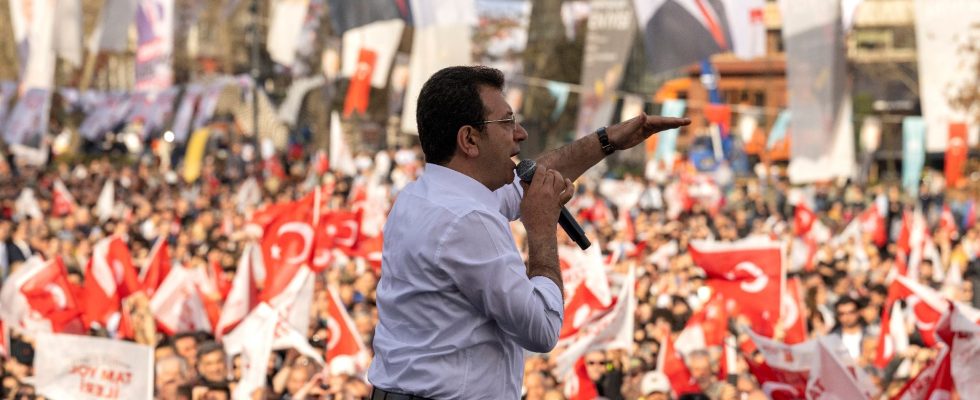61 million voters are called to vote this Sunday March 31 in Turkey. Residents of large cities elect their local representatives: mayors, municipal councilors, district mayors and muhtar – a sort of neighborhood leader. In Istanbul, where voters have the choice between 49 candidates, the ballot paper measures no less than… 97 centimeters wide. But among the host of political parties, two of them, the Justice and Development Party (AKP, Islamo-conservative) of President Recep Tayyip Erdogan, and the Republican People’s Party (CHP, social democrats), whose is from the current mayor of Istanbul, Ekrem Imamoglu, play much more than a victory in the municipality.
The AKP, which lost Istanbul in 2019 after twenty-five years at its head, and its candidate Murat Kurum intend to recover this “national treasure” from the hands of Ekrem Imamoglu, the leader of the opposition who stole the main and richest city in the country. His party, the CHP (social democrats), also managed to win the capital Ankara, but also Izmir and Mersin. In the event of reappointment to the banks of the Bosphorus, Ekrem Imamoglu could thus become a favorite for the 2028 presidential election.
Because ancient Constantinople is “the biggest trophy of Turkish politics”, summarizes Berk Esen, a political scientist at Sabanci University in Istanbul, to AFP. Erdogan himself served as mayor in the 1990s, which propelled his political career. At the end of last week, the polls gave the advantage to the outgoing mayor. But in May 2023, they predicted a defeat for the AKP, which had nevertheless been renewed with 52% of the votes.
A “referendum” for Erdogan’s re-election
Reason why Erdogan, 70 years old, and in power since 2003 (first as Prime Minister then as President from 2014) threw himself body and soul into the campaign, holding up to four meetings a day to support Murat Kurum, former minister considered uncharismatic. Officially, the president, re-elected less than a year ago for a third term which will end in 2028, cannot run again. But “if he manages to return to Istanbul and Ankara, Erdogan will see this as an encouragement to modify the Constitution to represent himself”, analyzes for AFP Bayram Balci, researcher at the Center for International Studies and Research (Ceri)-Sciences- Po in Paris.
Taking advantage of his unlimited speaking time on television, the head of state regularly throws barbs at the current mayor of Istanbul – without ever mentioning his name. Ekrem Imamoglu is thus portrayed as an ambitious man who cares little about his city, elected “part-time” and obsessed with the presidency. “Istanbul has been abandoned to its fate over the past five years,” criticizes Erdogan. “We aspire to save it from disaster.” In a country faced with 67% official inflation over twelve months and the decline of its currency (from 19 to 31 pounds to the dollar in one year), voters may be tempted to give the advantage to the opponents of the head of the the state. In Istanbul, Ekrem Imamoglu, for his part, made sure to stay on local issues, listing his achievements and those to come.
The opposition divided
But unlike the 2019 election, in which he was supported by the “nation alliance” – a front of six parties, ranging from the left pro-Kurdish Dem, to the nationalist IYI formation, all opposed to Erdogan – this coalition is today crumbled. The IYI (Good Party, Nationalist) and the Dem (Party of Equality of Peoples and Democracy), third force in Parliament, are in fact presenting their own candidate for mayor of Istanbul. “If Imamoglu manages to hold on, he will have won his battle within the opposition to establish himself” as leader for the next presidential election, notes Bayram Balci, researcher at the Center for International Studies and Research (Ceri) -Sciences-Po in Paris.
The votes of the Kurds, who represent around a fifth of Turkey’s 85 million inhabitants, according to estimates, are again highly coveted this year. The Dem is expected to capture many cities, despite an expected breakthrough from Hüda Par, a far-right Kurdish party. Elsewhere in the country, a significant share of Kurdish voters could line up behind the CHP in order to block the AKP, according to opinion polls.
For its part, the presidential party could also decline in several large cities in Anatolia in favor of an ultra-conservative formation (Yeniden Refah), analysts predict. The first significant results are expected at the end of the day.
